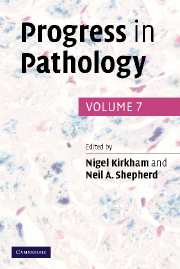Book contents
- Frontmatter
- Contents
- List of Contributors
- Preface
- 1 The microbiological investigation of sudden unexpected death in infancy
- 2 An overview of childhood lymphomas
- 3 Assessment of the brain in the hospital consented autopsy
- 4 The value of immunohistochemistry as a diagnostic aid in gynaecological pathology
- 5 The role of the pathologist in the diagnosis of cardiomyopathy: a personal view
- 6 Metastatic adenocarcinoma of unknown origin
- 7 Immune responses to tumours: current concepts and applications
- 8 Post-mortem imaging – an update
- 9 Understanding the Human Tissue Act 2004
- 10 The Multidisciplinary Team (MDT) meeting and the role of pathology
- 11 Drug induced liver injury
- Index
- References
9 - Understanding the Human Tissue Act 2004
Published online by Cambridge University Press: 06 January 2010
- Frontmatter
- Contents
- List of Contributors
- Preface
- 1 The microbiological investigation of sudden unexpected death in infancy
- 2 An overview of childhood lymphomas
- 3 Assessment of the brain in the hospital consented autopsy
- 4 The value of immunohistochemistry as a diagnostic aid in gynaecological pathology
- 5 The role of the pathologist in the diagnosis of cardiomyopathy: a personal view
- 6 Metastatic adenocarcinoma of unknown origin
- 7 Immune responses to tumours: current concepts and applications
- 8 Post-mortem imaging – an update
- 9 Understanding the Human Tissue Act 2004
- 10 The Multidisciplinary Team (MDT) meeting and the role of pathology
- 11 Drug induced liver injury
- Index
- References
Summary
‘Beauty is momentary in the mind –
The fitful tracing of a portal;
But in the flesh it is immortal.
The body dies; the body's beauty lives.’
Wallace Stevens, 1879–1955 (American poet)INTRODUCTION
The Human Tissue Act [1] gained Royal Assent on 15 November 2004 and its regulations have been in force since September 2006. It is a complex legal document which has been shrouded in controversy and a degree of confusion since its creation. Countless hours have been spent consulting on and finalising the details of the legislation that regulates comprehensively the storage, removal and use of human tissue from both the living and the dead. The principle issue underpinning the Act is one of patient consent.
Human tissue forms the foundation of pathologists' clinical work, research, audit and education. It must be stressed, however, that pathologists are not the only individuals who will have to work within these new laws; anatomists, transplant clinicians, geneticists and even museum curators are among many others who will need to abide by its rulings. Some of the difficulties encountered in the formation of this legislation stem from the diverse nature of the essential activities performed using human tissues. This is contributed to by the fact that the intricacies of much of this work are little known by those outside the respective fields (Fig. 9.1), and therefore there has been the need for considerable consultation.
The depth of emotion surrounding human tissue should not be underestimated.
- Type
- Chapter
- Information
- Progress in Pathology , pp. 221 - 234Publisher: Cambridge University PressPrint publication year: 2007

